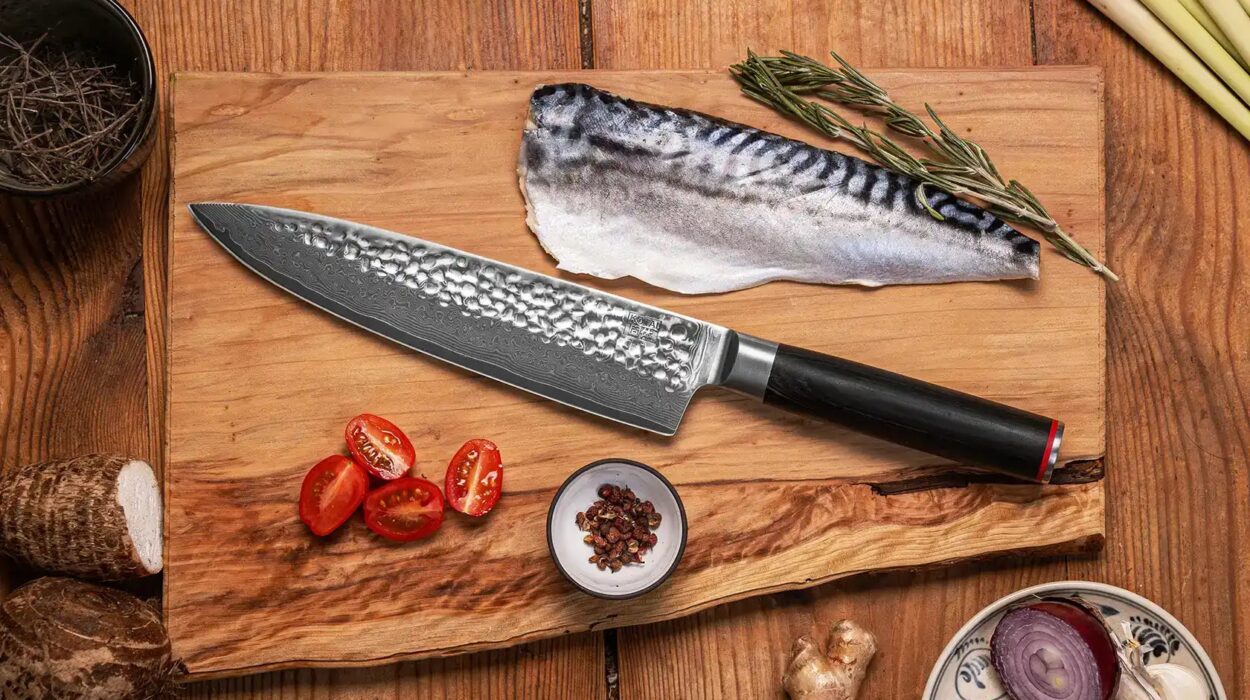If you’re a cooking enthusiast or a professional chef, you likely understand the importance of a good knife in your kitchen. One knife that stands out due to its strength and beauty is the heat treated Damascus steel knife. This unique culinary tool not only enhances the aesthetics of your kitchen but also ensures a superior cutting experience.
The history behind Damascus steel is fascinating. Known for its distinctive patterns reminiscent of flowing water, it has been a staple for swordsmiths and knife makers for centuries. The key to these blades distinct durability and flexibility lies in the heat treatment process they undergo.

Understanding Damascus Steel
What is Damascus Steel?
Damascus steel refers to a forged steel known for its patterned surface. This pattern is a result of combining different types of steel or iron, creating a blend that boasts impressive strength and sharpness.
Origin of Damascus Steel
Historically, Damascus steel was used in swordmaking. Its origin dates back centuries when it was first made from wootz steel imported from India. The techniques used in these early creations have been lost, but modern techniques aim to replicate these legendary blades.
For a deeper dive into its roots, you can explore the detailed history about who made the first Damascus steel on Blade Magazine.
The Importance of Heat Treating
What is Heat Treating?
Heat treating is a process where the steel is heated and cooled under controlled conditions to improve physical properties. This results in a blade that maintains sharpness longer and resists breaking under stress.
Benefits of a Heat Treated Knife
The primary advantage of a heat treated knife is its enhanced durability. By undergoing heat treatment, the knife gains a resilient structure, able to withstand rigorous kitchen tasks while maintaining a sharp edge.
Differences in Damascus Steel Knives
Why Choose Damascus Steel?
Choosing a Damascus steel knife means selecting quality. These knives are not only beautiful but also efficient, making them suitable for both amateur cooks and professional chefs. Each knife has unique patterns, ensuring that your tool is one-of-a-kind.
For more options, consider looking into a variety of Damascus knives available as holiday gift sets on Damascus Knife Gift Sets.
Comparing with Other Steels
Compared to traditional stainless steel knives, Damascus knives offer superior edge retention and strength. They are, however, often more expensive and may require specific maintenance to maintain their appearance and function.
Construction of Damascus Knives
Layering Techniques
The distinctive patterns of a Damascus knife are achieved by layering different metals. Modern versions use techniques like pattern welding, which layers steel and iron together before forging them into a single blade.
Unique Finishes
The intricate finish of each Damascus steel knife is part of what makes them so prized. This finish is not only visually stunning but also aids in the blades resistance to rust and corrosion.
Maintaining Your Damascus Steel Knife
Cleaning and Care Tips
To maintain the beauty and functionality of your Damascus knife, regular cleaning and proper storage are crucial. After each use, wash the knife by hand and thoroughly dry it to prevent moisture damage.
Sharpening Your Blade
While Damascus knives hold an edge well thanks to heat treatment, they still require occasional sharpening. Use a whetstone for best results, as this method offers precision and preserves the knifes integrity.
Purchasing Damascus Steel Knives
Where to Buy
With the surge in popularity, there are many places to purchase a Damascus steel knife. Ensure you buy from reputable sources to avoid low-quality imitations. You can find specially crafted options at Custom Engraved Damascus Knives.
Cost Considerations
Damascus steel knives are an investment. While they may come with a higher price tag, their longevity and performance make them worth the cost. Consider this investment as a lifetime tool for your kitchen.

Conclusion
The allure of a heat treated Damascus steel knife is understandableit combines ancient techniques with modern craftsmanship, resulting in a piece that is both practical and aesthetically pleasing. Whether for home use or professional kitchens, these knives are a testament to enduring quality and elegance.
FAQ
What makes Damascus steel special compared to other steels?
It’s renowned for its strength, durability, and the visually striking patterns that come from layering different metals.
How often should I sharpen my Damascus steel knife?
While they maintain their edge well, routine sharpening with a whetstone is recommended to ensure maximum efficiency.
Can Damascus steel knives rust?
Yes, if not cared for properly. Regular cleaning, drying, and oiling can prevent rust and preserve the knifes quality.
This article contains affiliate links. We may earn a commission at no extra cost to you.


